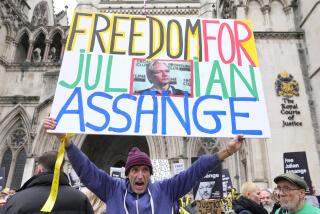British Reject Tribunal Plan for Detainees
- Share via
LONDON — In a challenge to the Bush administration’s policies at Guantanamo prison, this country’s top legal officer said today that U.S. plans to try British citizens in a military tribunal are “unacceptable” because the proceedings would be unfair and violate international standards.
The public protest of planned U.S. military tribunals by Lord Peter Goldsmith, the British attorney general, comes in spite of a U.S. promise to Britain that its citizens would not be subject to the death penalty, as would prisoners of other nationalities, and the release in March of five of the nine British internees.
It also comes as the U.S. Supreme Court is expected to rule on the legality and constitutionality of the Guantanamo prison camp. Some 600 inmates gathered from 40 countries around the world have been held there, some for more nearly three years, without access to attorneys or their families, and with no fixed terms of incarceration.
Britain is the closest ally of the United States in the war on terrorism, and has provided more than 10,000 troops to the U.S.-led coalition force in Iraq.
But after months of quiet diplomacy failed to move the Bush administration to accept requests from Foreign Minister Jack Straw to either enhance rights for the accused or to repatriate the remaining British inmates so that they can be investigated and tried here, officials apparently have decided to ratchet up the public pressure.
Of the four British prisoners, two are among the first six individuals scheduled to appear before military tribunals in coming months.
Goldsmith has been leading British efforts to negotiate with the U.S. authorities for better legal standards for the British detainees, captured in Afghanistan, Pakistan and other countries, suspected of being supporters of Al Qaeda.
His remarks, to be delivered tonight at the International Criminal Law Assn. in Paris, were made public to the BBC and Britain’s Press Assn. in advance.
Goldsmith said that Britain is prepared to accept “some limitation of fundamental rights” in the war on terrorism, but “there are certain principles on which there can be no compromise.”
“Fair trial is one of those — which is the reason that we in the U.K. have been unable to accept that the US military tribunals proposed for those detained in Guantanamo Bay offer sufficient guarantees of a fair trial in accordance with international standards,” he said.
Human rights groups have harshly criticized the military commissions, ordered by President Bush in November 2001. They say the judges, as military officers, would not be independent, and that under current plans the defendants’ own lawyers would not be allowed to question witnesses or see all the evidence against them. Evidence obtained through coercive means, they add, could be used against them.
In additions, they say, convictions would not be subject to review by an independent judiciary and only President Bush, as commander in chief, would be able to grant pardons.
In public statements, Bush has already labeled the Guantanamo prisoners “killers.” Despite objections of the International Committee of the Red Cross, Guantanamo prisoners have not been granted prisoner of war status, under which they could be afforded protections under the Geneva Convention, but instead have been referred to by the U.S. government as “enemy combatants” and “terrorists.”
The practices at Guantanamo have received increased international scrutiny after the public criticism of the International Committee of the Red Cross, and the recent emergence of allegations of abuse and photos of apparent torture at Abu Ghraib prison in Iraq.
U.S. officials have denied accusations by released prisoners that those held at Guantanamo are subjected routinely to abuse, and contend that inmates there are treated humanely and in accordance with international standards and U.S. law.
The first two British nationals scheduled to go before the tribunals are Feroz Abassi, 23, of south London, and Moazzam Begg, 38, of Birmingham.
According to his father, Begg, the one-time proprietor of an Islamic bookstore, had traveled to Afghanistan to carry out community projects. He was arrested in Pakistan after having fled the war in Afghanistan with his wife and children.
Abassi, allegedly captured with the Taliban during the war, has been identified in press reports as a former follower in London of extremist cleric Abu Hamza al-Masri, who is in British custody fighting extradition to the United States.
More to Read
Sign up for Essential California
The most important California stories and recommendations in your inbox every morning.
You may occasionally receive promotional content from the Los Angeles Times.













